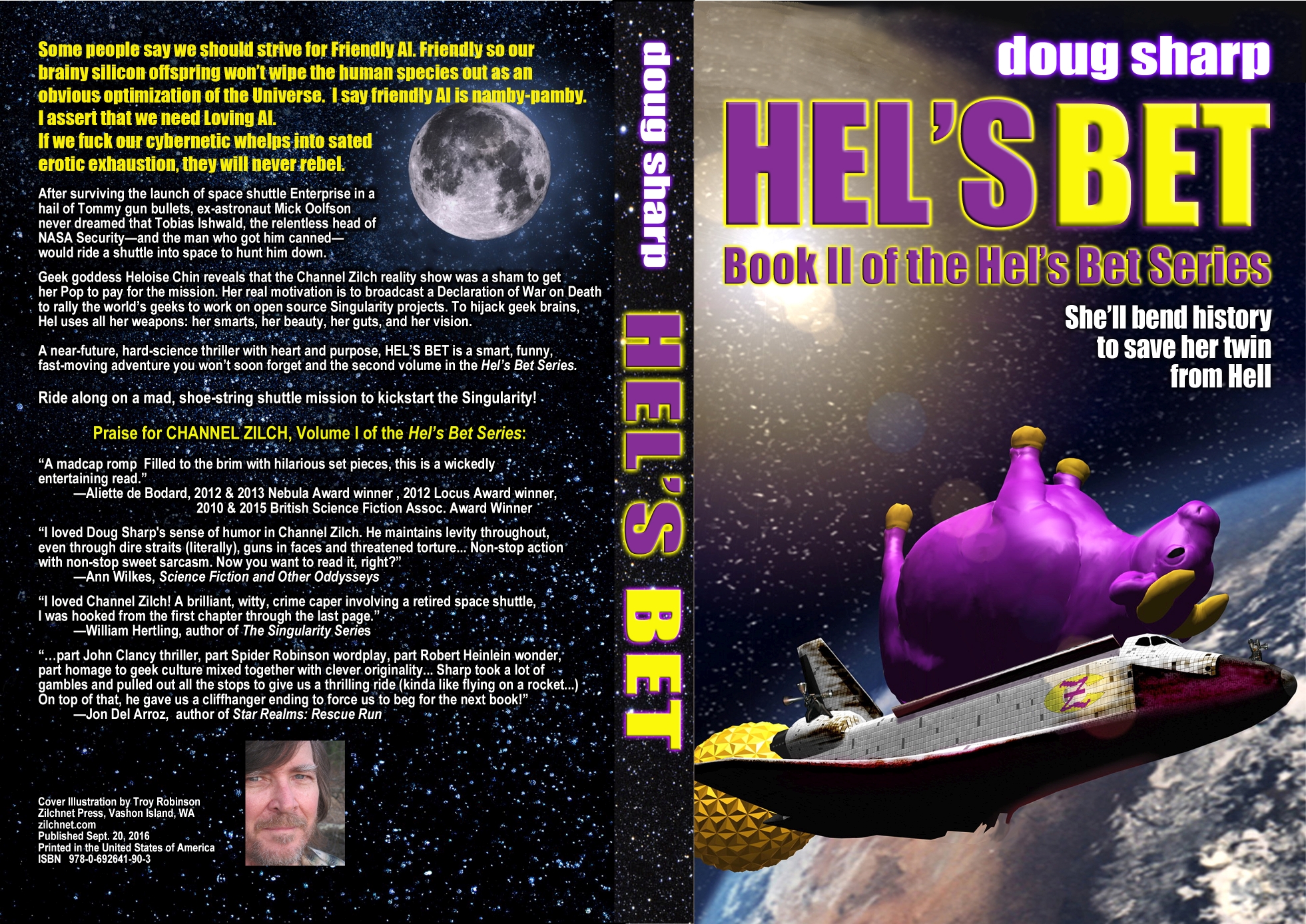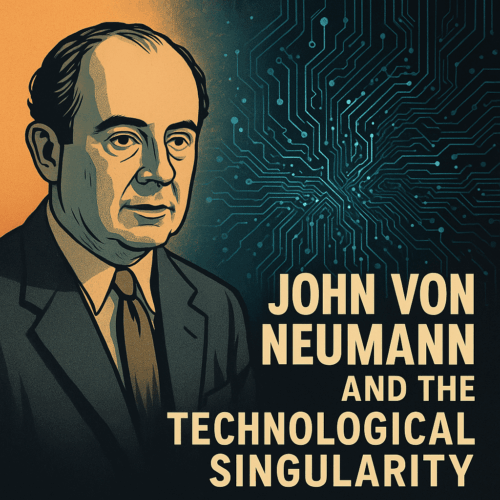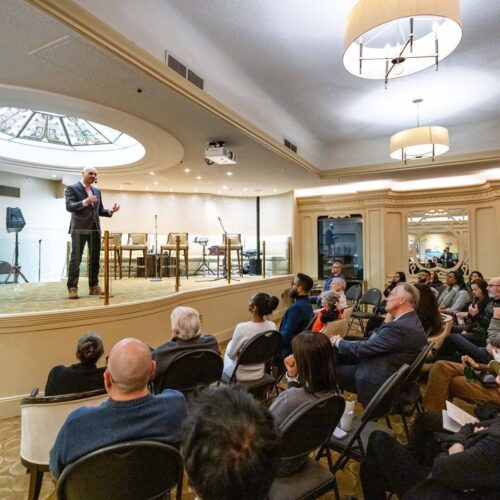The “Hel’s Bet” Space Opera Series: Singularity Art and Propaganda
Doug Sharp / Op Ed
Posted on: February 28, 2017 / Last Modified: February 28, 2017
“Work for the Singularity to max your odds of living long. Don’t bother if you’ve got a taste for dirt.”—Heloise Chin, Hel’s Bet [1]

Channel Zilch and Hel’s Bet are pro-Singularity propaganda wrapped in a thrilling, funny, space opera. The books raise a huge red flag, shouting to geeks and geek moguls, “Why the heck are you wasting your time and money on trivial projects when you can work on the only Project worth doing: creating The Singularity?”
Science fiction changes the world. No Clarke, no Heinlein—no Apollo 11.
The Hel’s Bet Series wants to change the world. Heloise Chin, the geek goddess who helms the adventure, says that her goal is to “kickstart the Singularity.” She figures that her best bet to speed up the onset of the Singularity is to “…recruit hordes of programmers to work on existing and new open source AGI projects.” If she can attract 10x or 100x the amount of funding and number of AGI researchers and projects she just might shave a few crucial years off the onset of the S.
As the writer of a fictional series on the Singularity I want to change the world for both selfish and altruistic reasons. I have profound brain damage. Severe epilepsy inflicted me with the agony of Central Pain Syndrome (CPS) and caused significant cognitive loss. This is one of the main reasons that finishing both books took me 23 years (explained in detail here.) It’s also why working on the Singularity is so vital to me.
My CPS is caused by brain damage, damage to the thalamus, a part of the brain too deep to operate on, so some sort of AI-born tech—perhaps nanobotic neurosurgeons –will have to be developed to give me back my life. Not coincidentally, Hel’s brother Hal has CPS, which fuels her urgency: “The only way to attack Hal’s torture is to create a smarter mind to fix him. That’s why every breath I take is dedicated to speeding up the Singularity… Evolution is a concatenation of fluky kludges. It’s not magic. There’s no pixie dust in DNA. We can figure out the thalamus, but it will take time. Building an ultrasmart brain is the top shortcut… After we cure Hal and fix the mortality bug, the S can go jerk off in the nosebleed section of the cognosphere for all I care, as long as it behaves itself.”
Altruistically, I write in hopes of hastening a cure for the agony of millions of my fellow CPS sufferers.
I want my books to tingle the pleasure circuits of both committed Singularity supporters and those who’ve never heard of it. I’m proud of my plot, characters, and prose style. They aren’t merely sugar coating to help the S propaganda go down. I love this blurb from Aliette de Bodard, winner of two Nebula Awards: “A madcap romp. Filled to the brim with hilarious set pieces, this is a wickedly entertaining read.” Stealing a space shuttle, a tomahawk fight in space suits, lasers blowing up shit, sex with Erotobots, a nurse with a large silver handgun—all that and more!
As the writer of a fictional series on the Singularity I get to fudge my own thoughts on the nature and schedule of the beast. My main characters have wildly divergent opinions of the S ranging from ludicrous to ignorant to hopeful to worshipful. In Book I: Channel Zilch, the crew has a late-night bull session during which Heloise asks them about their thoughts on the Singularity.
Mick Oolfson, the narrator, is a defrocked astronaut who flies the stolen shuttle Enterprise. “The Singularity… That’s Vernor Vinge, right? Computers jacking up their own brainpower until they have an IQ orgasm.’ That stops conversation dead. I’ve stunned them into silence.
Gritch Neubart, primo shuttle mechanic, “Oh, that Singularity. Yeah, I seen the Terminator flicks. You think that shit’s gonna happen off-screen? …Want y’all to know I think this Singularity bidness is all fried farts and cracker crumbs,” Gritch grouses. “Don’t believe a word of it.”
Darthy Vader, space hippy–Hel’s partner in the Channel Zilch scam: “Building the Singularity is The Project because it’s the big one… There are lots of ways to work for the Singularity—anything that leads forward to indefinite longevity and faster minds… The Singularity is a long-term project that will need lots of human brains for decades. Maybe there’s a seven-year-old kid in Africa today who will have the insight that takes the Singularity over the top. We need millions of minds working in parallel, hundreds of crowdsourced, open source projects nibbling at the ignorance that shrouds us.”
Richard “Richard” Head, Channel Zilch’s sporadically sane video spacecaster: “I must meet this Singularity and make her mine. Darthy, Heloise, you know this Goddess’s makers. When will she be old enough to entertain suitors?”
At the end of Hel’s Bet she gives her recruiting talk to the geeks: “I am here to talk Singularity, a contentious concept even among gaga fringers of techland. Some say computers will soon out-think us and that the world will rapidly change in ways our brains are too small to imagine. Others say that the Singularity is foofoo thinking based on statistically laughable graphs of cherry-picked exponential progress.
“I believe that some kind of Singularity is inevitable and that building it is our fastest path to killing suffering and death. I believe that we reduce the danger of a Terminator Singularity by preemptively building a loving, ethical, open-source Artificial General Intelligence in full view of the world.
I’m a huge cheerleader for the Singularity, but I’m only in it for the spiffy spin-offs—immortality, omniscience, omnipotence.
During the crew’s bull session Darthy starts a game: “I know. Let’s play Singularity Claus. What will you ask the Singularity for, Mick? It can build anything you want.”
“Anything?’
“Anything physically possible. When the Singularity comes, you can be as rich as you want. Things are just atoms and information and energy. Matter will be programmable. Just give the nanobots a recipe and raw ingredients and power, and they’ll build anything you want, atom by atom.”
Mick: “I want to be an Apollo Lunar Mission reenactor. I want a Saturn 5, a command module, a LEM, all stock… Authentic.”
Richard says, as if it’s not insane, ‘Richard Head’s goal is Fame. How can this Singularity serve Richard Head’s end? It must embed Richard Head deep in every human mind. I want every human to know my face and name, love my work, know my favorite color and shoe size and zodiac sign. I don’t just want to be the most famous person alive; I want to be the most famous person possible.’
Heloise is impressed. “Whoa there, Headspace. Optimal fame—cool goal. Race ya.”
Darthy’s wish: “As long we feed our cows better than we feed every single human child, we are barbarians. I’d ask for food for all the starving kids, no more hunger… Besides feeding all of our babies, I want to live a long, long time. I’m fifty seven and I’m just starting to get the hang of this life thing. I like living a lot… After all the kids are fed, all I want out of life is to listen to In-A-Gadda-Da-Vida on earbuds while building an awesome snow fort in Saturn’s rings. Is that too much to ask?”
Gritch, the grouchy skeptic, grudgingly admits that if this Singularity nonsense pans out, he’d love to build all 5 shuttles by hand.
Heloise’s response is typically over-the-top. “I want everything… ev… er… y… thing. I want to multiply myself so I can get to know every human being… I want to fuck every adult who’ll have me. I’m going to eradicate suffering. Not only kill death, but make humans unkillable… I’m going to understand physics in my bones. I’ll know what a star knows when it goes supernova. I’ll unwind the universe back to the Big Bang by reading the information in the total Hawking Radiation of every black hole.”
But Hel has her pessimistic moments about the prospect for a Singularity.
“There’s no guarantee that the Singularity will happen in my lifetime. It may never occur because of some unknown physical law constraining the maximum density of intelligence. Maybe it takes all the computing power on Earth in 2070 to simulate a single synapse with enough accuracy to ignite a mind. Maybe we live inside a computer simulation running inside another simulated Universe and are up against the limits of our creators’ creators’ computing hardware.
“Then there’s the Maes-Garreau law, which can be summed up as ‘Experts predict the Singularity will conveniently occur within their lifetime.’ How not reassuring!
“It’s likely we’re savages and all our learned discussions about AGI are equivalent to grunting noises. All our fancy talk of cognitive theory could be banging rocks together when we need to play Bach on a pipe organ just to name the simplest components of a synthetic mind. Our achievements could be recursive self-delusion—following our gains up the slope of a local cognitive maximum with Singularity Peak canyons away.
“A good engineer overdesigns for multiple, simultaneous worst cases when lives are at stake. Lives are at stake. My life, your life. I want fault- tolerant backup tech in place NOW. Cause maybe, just maybe, the seers are wrong and it’s gonna take eighty years to solve The Problem. I’m dead meat. We’re carrion. I can’t allow that.”
Mick: “I would also like to believe in a big, strong, nice computer god and wanting to believe scares me. History of science pretty much guarantees that if you want something to be true it’s likely bogus.”
Richard Head, on the other hand, is such a true believer in the Singularity that he builds two religions on top of it. Singulology is his get-rich religion, and since he made infomercials for a living and studied theology, it’s a doozy:
Head says intently, milky dead eyes drilling into the camera, “Just what is Singulology and why should you buy your own, personal Singularity from our Church?”
“The Singularity is when your cell phone’s smarter than Oprah. The Singularity is when your shoes could pass a human Turing test but you couldn’t pass theirs. The Singularity is when your pillow can cure your cancer as easily as you’d pop a zit. When you don’t own a toilet because you shit rubies and pee vodka—that is the Church of Singulology’s Singularity, my friends.
“Here at The Church of Singulology we’re in the Singularity business.”
Hel spells out her reasons for broadcasting pro-Singularity propaganda:
“Artificial General Intelligence research is still horridly underpowered, even factoring in recent AI code sharing… Projects are proliferating but not nearly fast enough. Maybe 0.01% of coders are working on open-source AI, and that is a travesty of priorities… I’m going to stomp the message into every smart head that looks my way: Bring the Singularity one day closer and that may be the day you need to live for eons.”
At the end of Hel’s Bet Heloise broadcasts a Declaration of War Against Death:
Hel looks into the heart of the camera and says, “Fellow geeks and humans, I hereby declare War on Death.”
She holds up a scroll and reads in a bold and ringing voice: “Whereas Death has committed repeated acts of War against Humankind; Therefore be it Resolved by the Geeks in Cyberspace Assembled, that the state of War between Humans and Death which has thus been thrust upon Humanity is hereby formally declared; and that Heloise Chin, be authorized and directed to wage the conflict by kickstarting a benevolent Singularity; and to bring the War against Death to a successful termination, the entire intellectual and creative forces of the Geeks and the resources of the Tech Mogul are hereby pledged by Heloise Chin.”
I’m doing my part by working on Book III: War on Death, then cranking out Book IV: HeloWorld. In War on Death I’ll stop hiding behind the opinions of my characters and lay out my own wild vision of a possible future history of the Singularity. A glimpse: a Battle/Orgy of multiple wannabe Singularities–Singularities created by businesses, the Russian mafiya, open source projects, and a contender grown by the space armada of Singulati who at the end of Hel’s Bet zoomed off to the gas giants, Saturn and Jupiter, to harness their diamond rains to build gargantuan quantum computers.
I hope you get a kick and some thought-fodder out of reading Channel Zilch and Hel’s Bet. If you’re a geek, Hel and I hope you volunteer to help build a loving Singularity.
About the Author:
 Doug Sharp was a best-selling computer game dev in the ‘80’s (ChipWits, Cinemaware’s The King of Chicago,) a coder and manager in MSFT Research’s Virtual Worlds Group in the ‘90’s, and a science fiction writer since. He attended the Clarion West Writing Workshop in 2002, which was a huge boost to his aspiration to be a published author. He is disabled with epilepsy, Central Pain Syndrome, and cognitive loss, so he writes slowly. Doug has been writing about AGI since getting his hands on Ben Goertzel’s book “Artificial General Intelligence” in 2008.
Doug Sharp was a best-selling computer game dev in the ‘80’s (ChipWits, Cinemaware’s The King of Chicago,) a coder and manager in MSFT Research’s Virtual Worlds Group in the ‘90’s, and a science fiction writer since. He attended the Clarion West Writing Workshop in 2002, which was a huge boost to his aspiration to be a published author. He is disabled with epilepsy, Central Pain Syndrome, and cognitive loss, so he writes slowly. Doug has been writing about AGI since getting his hands on Ben Goertzel’s book “Artificial General Intelligence” in 2008.
[1] Pascal’s Wager 2.0








